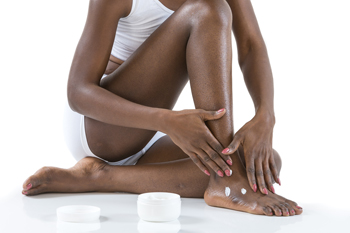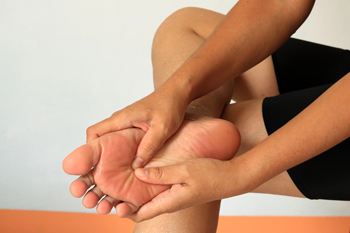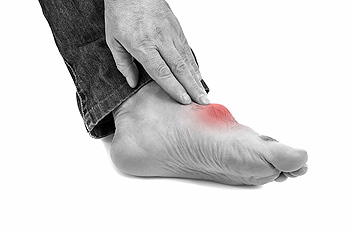Blog
Items filtered by date: June 2021
Three Facets of Foot Hygiene
 Maintaining the hygiene of your feet is very important and can prevent painful foot and nail problems, from athlete’s foot to ingrown toenails to foot wounds. When it comes to foot hygiene, there are three main areas to pay attention to: daily foot care, toenail care, and daily foot inspections. Daily foot care consists of washing and thoroughly drying the feet each day and wearing clean socks and shoes. When caring for the toenails, you should trim them straight across regularly. You should also use clean and sanitized nail clippers, and seek immediate care if your toenails appear discolored or misshapen. Daily foot inspections are a facet of foot care that is especially important for those who have diabetes, peripheral neuropathy, or poor circulation. Each day, check your feet for any abnormalities such as cuts, scrapes, sores, discoloration, lumps, and pain or strange sensations such as tingling or numbness. If you notice any foot or toenail problems, it is suggested that you schedule an appointment with a podiatrist near you.
Maintaining the hygiene of your feet is very important and can prevent painful foot and nail problems, from athlete’s foot to ingrown toenails to foot wounds. When it comes to foot hygiene, there are three main areas to pay attention to: daily foot care, toenail care, and daily foot inspections. Daily foot care consists of washing and thoroughly drying the feet each day and wearing clean socks and shoes. When caring for the toenails, you should trim them straight across regularly. You should also use clean and sanitized nail clippers, and seek immediate care if your toenails appear discolored or misshapen. Daily foot inspections are a facet of foot care that is especially important for those who have diabetes, peripheral neuropathy, or poor circulation. Each day, check your feet for any abnormalities such as cuts, scrapes, sores, discoloration, lumps, and pain or strange sensations such as tingling or numbness. If you notice any foot or toenail problems, it is suggested that you schedule an appointment with a podiatrist near you.
Everyday foot care is very important to prevent infection and other foot ailments. If you need your feet checked, contact one of our doctors from Favor Foot Ankle Leg & Wound Center. Our doctors can provide the care you need to keep you pain-free and on your feet.
Everyday Foot Care
Often, people take care of their bodies, face and hair more so than they do for their feet. But the feet are a very important aspect of our bodies, and one that we should pay more attention to. Without our feet, we would not be able to perform most daily tasks.
It is best to check your feet regularly to make sure there are no new bruises or cuts that you may not have noticed before. For dry feet, moisturizer can easily be a remedy and can be applied as often as necessary to the affected areas. Wearing shoes that fit well can also help you maintain good foot health, as well as making it easier to walk and do daily activities without the stress or pain of ill-fitting shoes, high heels, or even flip flops. Wearing clean socks with closed shoes is important to ensure that sweat and bacteria do not accumulate within the shoe. Clean socks help to prevent Athlete’s foot, fungi problems, bad odors, and can absorb sweat.
If you have any questions please feel free to contact our office located in South Amboy, NJ . We offer the newest diagnostic and treatment technologies for all your foot and ankle needs.
Why Does Diabetes Cause Foot Wounds?
Painful, slow-healing foot wounds are unfortunately a common occurrence in people who have diabetes. Left untreated, these wounds can grow and become diabetic foot ulcers (DFUs). About 1 in 4 people with diabetes will develop a diabetic foot ulcer at some point in their lives. Why are foot wounds so common among diabetics? The answers lie in the way that blood glucose levels affect the nervous system and circulation. High levels of glucose can damage peripheral nerves. These are the nerves responsible for sensation in the lower limbs. When they are damaged, your ability to feel pain and other early signs of a foot injury are diminished. This means that many cuts, sores, and scrapes on the feet are left undetected until they begin to cause more serious symptoms. Another complication of high glucose levels is poor circulation or blood flow to the lower limbs. When blood moves more slowly towards the feet, it cannot deliver nutrients quickly enough to heal wounds efficiently, thus slowing down the healing process. If you have diabetes, it is important to monitor the health of your feet to avoid foot wounds, DFUs, and all of their associated complications. A podiatrist can help you maintain your foot health.
Diabetic foot care is important in preventing foot ailments such as ulcers. If you are suffering from diabetes or have any other concerns about your feet, contact one of our doctors from Favor Foot Ankle Leg & Wound Center. Our doctors can provide the care you need to keep you pain-free and on your feet.
Diabetic Foot Care
Diabetes affects millions of people every year. The condition can damage blood vessels in many parts of the body, especially the feet. Because of this, taking care of your feet is essential if you have diabetes, and having a podiatrist help monitor your foot health is highly recommended.
The Importance of Caring for Your Feet
- Routinely inspect your feet for bruises or sores.
- Wear socks that fit your feet comfortably.
- Wear comfortable shoes that provide adequate support.
Patients with diabetes should have their doctor monitor their blood levels, as blood sugar levels play such a huge role in diabetic care. Monitoring these levels on a regular basis is highly advised.
It is always best to inform your healthcare professional of any concerns you may have regarding your feet, especially for diabetic patients. Early treatment and routine foot examinations are keys to maintaining proper health, especially because severe complications can arise if proper treatment is not applied.
If you have any questions please feel free to contact our office located in South Amboy, NJ . We offer the newest diagnostic and treatment technologies for all your foot and ankle needs.
We Can Treat Your Foot or Ankle Pain
A Brief History of Gout
Gout is a type of arthritis which causes uric acid crystals to form on joints—most commonly in the big toe. Symptoms may include pain, inflammation, redness, and limited range of motion. Gout was first identified around 2640 B.C. in ancient Egypt, and has been studied by countless scientists and physicians dating back to Hippocrates who called it “the unwalkable disease”. Uric acid crystals from a gouty deposit were first seen under a microscope in 1679, and the 19th century chemist, Emil Fischer’s, work established the relationship between uric acid and purine—which can raise levels of uric acid in the body. Some famous people who may have experienced gout include King Henry III, Sir Issac Newton, Ben Franklin, Sir Lawrence Olivier, David Wells, Jim Belushi, and Jared Leto—after gaining 60 lbs. for a movie role. Risk factors include eating a diet high in purines, a family history of gout, obesity, certain medical conditions and medications, and more. If you have pain or inflammation in your big toe, make an appointment with a podiatrist for an examination.
Gout is a painful condition that can be treated. If you are seeking treatment, contact one of our doctors from Favor Foot Ankle Leg & Wound Center. Our doctors will treat your foot and ankle needs.
What Is Gout?
Gout is a form of arthritis that is characterized by sudden, severe attacks of pain, redness, and tenderness in the joints. The condition usually affects the joint at the base of the big toe. A gout attack can occur at any random time, such as the middle of the night while you are asleep.
Symptoms
- Intense Joint Pain - Usually around the large joint of your big toe, and it most severe within the first four to twelve hours
- Lingering Discomfort - Joint discomfort may last from a few days to a few weeks
- Inflammation and Redness -Affected joints may become swollen, tender, warm and red
- Limited Range of Motion - May experience a decrease in joint mobility
Risk Factors
- Genetics - If family members have gout, you’re more likely to have it
- Medications - Diuretic medications can raise uric acid levels
- Gender/Age - Gout is more common in men until the age of 60. It is believed that estrogen protects women until that point
- Diet - Eating red meat and shellfish increases your risk
- Alcohol - Having more than two alcoholic drinks per day increases your risk
- Obesity - Obese people are at a higher risk for gout
Prior to visiting your podiatrist to receive treatment for gout, there are a few things you should do beforehand. If you have gout you should write down your symptoms--including when they started and how often you experience them, important medical information you may have, and any questions you may have. Writing down these three things will help your podiatrist in assessing your specific situation so that he or she may provide the best route of treatment for you.
If you have any questions, please feel free to contact our office located in South Amboy, NJ . We offer the newest diagnostic and treatment technologies for all your foot care needs.
How Is Plantar Fasciitis Diagnosed?
 Plantar fasciitis, the inflammation of the ligament that runs along the bottom of the foot, is a common injury among people who participate in sports. This condition usually causes stabbing heel pain. When diagnosing plantar fasciitis, your podiatrist will first take your medical history, asking you to describe the location, quality, and severity of your pain. The doctor will then complete a thorough physical examination of the affected foot, noting any swelling and tenderness, the foot’s range of motion, and the impact of the injury on the way you walk. Imaging studies, such as X-rays or MRIs, may be ordered to rule out other conditions, such as stress fractures or heel spurs, that can cause similar symptoms. If you are experiencing foot pain, please consult with a podiatrist.
Plantar fasciitis, the inflammation of the ligament that runs along the bottom of the foot, is a common injury among people who participate in sports. This condition usually causes stabbing heel pain. When diagnosing plantar fasciitis, your podiatrist will first take your medical history, asking you to describe the location, quality, and severity of your pain. The doctor will then complete a thorough physical examination of the affected foot, noting any swelling and tenderness, the foot’s range of motion, and the impact of the injury on the way you walk. Imaging studies, such as X-rays or MRIs, may be ordered to rule out other conditions, such as stress fractures or heel spurs, that can cause similar symptoms. If you are experiencing foot pain, please consult with a podiatrist.
Plantar fasciitis can be very painful and inconvenient. If you are experiencing heel pain or symptoms of plantar fasciitis, contact one of our doctors from Favor Foot Ankle Leg & Wound Center. Our doctors can provide the care you need to keep you pain-free and on your feet.
What Is Plantar Fasciitis?
Plantar fasciitis is the inflammation of the thick band of tissue that runs along the bottom of your foot, known as the plantar fascia, and causes mild to severe heel pain.
What Causes Plantar Fasciitis?
- Excessive running
- Non-supportive shoes
- Overpronation
- Repeated stretching and tearing of the plantar fascia
How Can It Be Treated?
- Conservative measures – anti-inflammatories, ice packs, stretching exercises, physical therapy, orthotic devices
- Shockwave therapy – sound waves are sent to the affected area to facilitate healing and are usually used for chronic cases of plantar fasciitis
- Surgery – usually only used as a last resort when all else fails. The plantar fascia can be surgically detached from the heel
While very treatable, plantar fasciitis is definitely not something that should be ignored. Especially in severe cases, speaking to your doctor right away is highly recommended to avoid complications and severe heel pain. Your podiatrist can work with you to provide the appropriate treatment options tailored to your condition.
If you have any questions please feel free to contact our office located in South Amboy, NJ . We offer the newest diagnostic and treatment technologies for all your foot and ankle needs.
The Progression of PAD
 Peripheral artery disease (PAD) is a condition that causes reduced blood flow in the lower limbs. PAD is fairly common, particularly in older people, and is caused by a buildup of plaque along the walls of the arteries. The plaque makes the arteries narrow and harden, which makes it harder for blood to circulate to the lower limbs and provide the muscles with oxygen and nutrients. This leads to symptoms that include pain, achiness, fatigue, burning, muscle cramps, and overall discomfort in the feet and ankles. At first, these symptoms may just appear when you do more strenuous physical activities like walking uphill, walking for longer distances, or running. Eventually, however, the symptoms may worsen and appear after only a little bit of activity. You may also begin to experience numbness in your lower limbs when you are at rest. If you have symptoms of PAD, please seek the care of a podiatrist.
Peripheral artery disease (PAD) is a condition that causes reduced blood flow in the lower limbs. PAD is fairly common, particularly in older people, and is caused by a buildup of plaque along the walls of the arteries. The plaque makes the arteries narrow and harden, which makes it harder for blood to circulate to the lower limbs and provide the muscles with oxygen and nutrients. This leads to symptoms that include pain, achiness, fatigue, burning, muscle cramps, and overall discomfort in the feet and ankles. At first, these symptoms may just appear when you do more strenuous physical activities like walking uphill, walking for longer distances, or running. Eventually, however, the symptoms may worsen and appear after only a little bit of activity. You may also begin to experience numbness in your lower limbs when you are at rest. If you have symptoms of PAD, please seek the care of a podiatrist.
Peripheral artery disease can pose a serious risk to your health. It can increase the risk of stroke and heart attack. If you have symptoms of peripheral artery disease, consult with one of our doctors from Favor Foot Ankle Leg & Wound Center. Our doctors will assess your condition and provide you with quality foot and ankle treatment.
Peripheral artery disease (PAD) is when arteries are constricted due to plaque (fatty deposits) build-up. This results in less blood flow to the legs and other extremities. The main cause of PAD is atherosclerosis, in which plaque builds up in the arteries.
Symptoms
Symptoms of PAD include:
- Claudication (leg pain from walking)
- Numbness in legs
- Decrease in growth of leg hair and toenails
- Paleness of the skin
- Erectile dysfunction
- Sores and wounds on legs and feet that won’t heal
- Coldness in one leg
It is important to note that a majority of individuals never show any symptoms of PAD.
Diagnosis
While PAD occurs in the legs and arteries, Podiatrists can diagnose PAD. Podiatrists utilize a test called an ankle-brachial index (ABI). An ABI test compares blood pressure in your arm to you ankle to see if any abnormality occurs. Ultrasound and imaging devices may also be used.
Treatment
Fortunately, lifestyle changes such as maintaining a healthy diet, exercising, managing cholesterol and blood sugar levels, and quitting smoking, can all treat PAD. Medications that prevent clots from occurring can be prescribed. Finally, in some cases, surgery may be recommended.
If you have any questions, please feel free to contact our office located in South Amboy, NJ . We offer the newest diagnostic and treatment technologies for all your foot care needs.
Blog Archives
- July 2025
- June 2025
- May 2025
- April 2025
- March 2025
- February 2025
- January 2025
- December 2024
- November 2024
- October 2024
- September 2024
- August 2024
- July 2024
- June 2024
- May 2024
- April 2024
- March 2024
- February 2024
- January 2024
- December 2023
- November 2023
- October 2023
- September 2023
- August 2023
- July 2023
- June 2023
- May 2023
- April 2023
- March 2023
- February 2023
- January 2023
- December 2022
- November 2022
- October 2022
- September 2022
- August 2022
- July 2022
- June 2022
- May 2022
- April 2022
- March 2022
- February 2022
- January 2022
- December 2021
- November 2021
- October 2021
- September 2021
- August 2021
- July 2021
- June 2021
- May 2021
- April 2021
- March 2021
- February 2021



